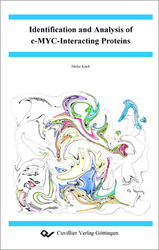| Fachbereiche | |
|---|---|
| Buchreihen (96) |
1379
|
| Nachhaltigkeit |
3
|
| Gesundheitswesen |
1
|
| Geisteswissenschaften |
2367
|
| Naturwissenschaften |
5407
|
| Mathematik | 229 |
| Informatik | 319 |
| Physik | 980 |
| Chemie | 1364 |
| Geowissenschaften | 131 |
| Humanmedizin | 243 |
| Zahn-, Mund- und Kieferheilkunde | 10 |
| Veterinärmedizin | 108 |
| Pharmazie | 147 |
| Biologie | 835 |
| Biochemie, Molekularbiologie, Gentechnologie | 121 |
| Biophysik | 25 |
| Ernährungs- und Haushaltswissenschaften | 45 |
| Land- und Agrarwissenschaften | 1004 |
| Forstwissenschaften | 201 |
| Gartenbauwissenschaft | 20 |
| Umweltforschung, Ökologie und Landespflege | 148 |
| Ingenieurwissenschaften |
1793
|
| Allgemein |
98
|
|
Leitlinien Unfallchirurgie
5. Auflage bestellen |
|
Erweiterte Suche
Identification and Analysis of c-MYC-Interacting Proteins
Heike Koch (Autor)Vorschau
Inhaltsverzeichnis, Datei (47 KB)
Leseprobe, Datei (170 KB)
Life of multicellular organisms depends on a balanced equilibrium of cellular growth, division, differentiation, and death. A large variety of mechanisms are in function to orchestrate these processes and assure permanent homeostasis. On the cellular level, progression through the cell cycle has to be tightly regulated in order to coordinate the interplay of growth and genome replication steps, which is monitored by different checkpoint pathways. In normal ontogenesis, a large number of proto-oncogenes fulfills essential functions for normal cell proliferation in response to extracellular signals like growth factors and cell-to-cell contacts. Mutation of any of these proto-oncogenes leading to proliferative defects can cause developmental abnormalities, a potentially preneoplastic state, and, when accumulated, result in cancer. The c-MYC (v-MYC avian myelocytomatosis viral oncogene homologue) gene represents a paradigm for the oncogenic switch in many human and animal cancers. In normal cells, protooncogenic c-MYC acts as one of the major regulators of proliferation indispensable for a wide spectrum of cell cycle processes. Precise control of the activity of c-MYC is a prerequisite to maintain cellular homeostasis as activation of c-MYC leads to unscheduled cell proliferation, extends the self-renewal capacity, and blocks the terminal differentiation of various cell types.
| ISBN-13 (Printausgabe) | 386727228X |
| ISBN-13 (Printausgabe) | 9783867272285 |
| ISBN-13 (E-Book) | 9783736922280 |
| Buchendformat | A5 |
| Sprache | Englisch |
| Seitenanzahl | 144 |
| Auflage | 1 |
| Band | 0 |
| Erscheinungsort | Göttingen |
| Promotionsort | München |
| Erscheinungsdatum | 10.05.2007 |
| Allgemeine Einordnung | Dissertation |
| Fachbereiche |
Biologie
Biochemie, Molekularbiologie, Gentechnologie |








